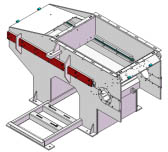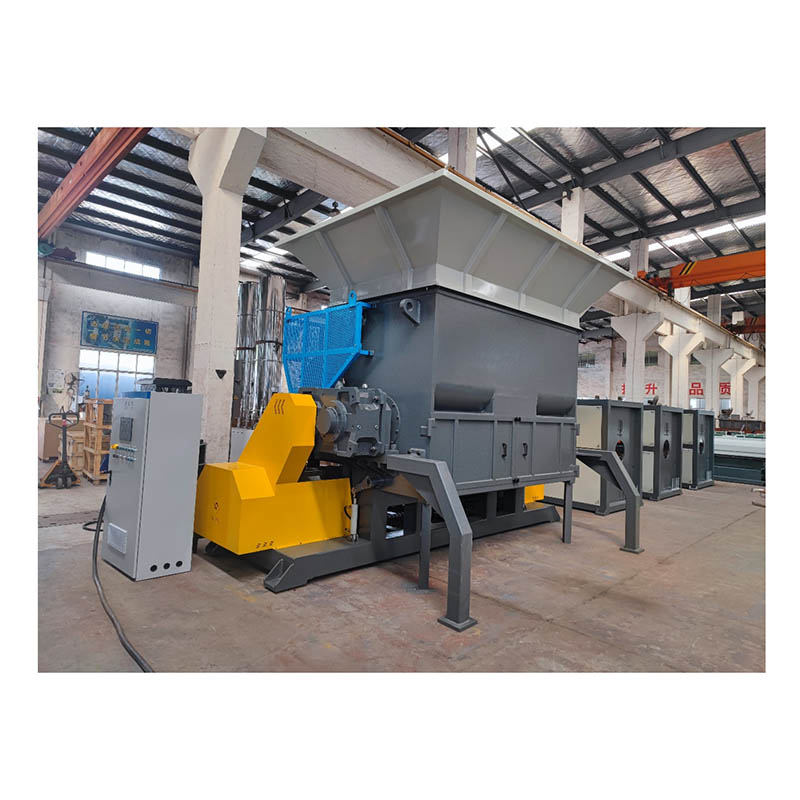She isn’t trying to save the planet with her business, but she is trying to make recycled, functional art.
From plastic take-out bag to a new, funky item. Plastic Granulator

Most people use a panini press to make sandwiches. Emma Crutcher uses hers to melt plastic and transform it into new creations that she sells via her business, Cool Trash.
It took some time for the Minneapolis artist to arrive at melting materials in a sandwich machine. In college, she studied art, urban studies, and sustainability (all three would eventually come into play here). Then, a few years after graduating, she discovered the work of Danish design student Dave Hakkens. His project, Precious Plastics, publishes open source blueprints that can be used to make small-scale, personal-use recycling machines.
“I've been following Hakken’s project since its beginning, and have just been obsessed, totally enamored with, and excited about [the project’s goal to] reframe the way we consider plastic as a material,” she says. “There is so much plastic waste in the world, but it is a valuable material.”
Crutcher was committed to working with plastic, but she soon realized that building an industrial shredding machine of her own wasn’t going to happen. Fortunately, she found new inspiration in YouTube tutorials where people fused layers of plastic bags together with an iron.
“I started experimenting at home at a hobby level,” she says. “But I also really wanted to get into trying to work with hard plastic, which is a whole different can of worms.”
That’s when Crutcher came across Brothers Make, a channel about melting plastic using household items—including a panini press. Soon she was working with one of her own.
Just as Crutcher uses household items to melt things, her materials come from the household, too, mainly in the form of HDPE, also known as high-density polyethylene plastic.
“HDPE is one of the most commonly found plastics: milk bottles, most cleaning products, laundry detergent bottles, bottle caps, and PakTechs,” she says. “PakTechs are really nice because they come in such a huge array of colors. And there's an abundance of them, because they are already made of recycled HDPE.”
A post shared by Cool Trash (@cooltrashnet)
Crutcher gets most of her plastic from local bars, breweries, friends and family, and her own personal use. After the plastics are amassed, she washes all the items and tears them up using a paper shredder. Then she lays them on the panini press, melting the plastic into sheets. Finally, she uses bandsaws, drills, and other smaller tools to cut and shape the plastic into commercial items like cutting boards, jewelry, fanny packs, shelves, and more.
The whole production is run solo out of her garage in south Minneapolis. Recently, she was able to purchase a large-scale sheet press machine, a stronger plastic shredder, and a computer numerical control (CNC) system that allows her to melt larger pieces of plastic and cut more detailed designs.
“I'm making a ton of ornaments like I’m in a little ornament factory right now,” she says. “Purchasing the CNC is making it so that my process is optimized and I can make more stuff, which means I can wholesale products to stores now, or contract with businesses.”
For example, Crutcher recently worked with Indeed Brewing to make colorful menu clipboards for their tap room. Making plastic clipboards and even cutting boards/butcher blocks is considered food-grade safe, since Crutcher does not chemically alter the composition of plastic; she just physically rearranges the shape.
Right now, Crutcher is focusing on making ornaments, earrings, hair clips, bolo ties, shelves, and charcuterie boards, the latter of which she calls “charcuterecyled.” Aside from working with hard plastic, she also makes fused plastic zipper pouches that can be used as toiletry bags, packing cubes, or for backpacking. These items can be found at her online store, as well as at a variety of pop-ups this season.
While other recycled goods often lack color, Crutcher makes sure hers are bright.
“I think this is the thing that really attracts people to what I am doing. I don't know if you see other recycled art, but most of it looks like shit. I hate it,” she says. “I want to make art that is different, that makes people go, ‘Woah, this is crazy!’”
It’s also important to her that people buy her products not solely because they’re made of recycled plastic, but actually want to use it in their everyday lives just as they would something from Target or IKEA.
“I have this anxiety–or this weird paranoia–that people think I’m an eco-warrior and I hate plastic…but I love plastic, I work with it because I love it,” she says. “I’m into making things that are beautiful but also functional, useful, cute, and cool.”
With an eye toward the future, Crutcher would love to go beyond creating items for the home into making parts of the home.
“Most of my friends and people I know are buying houses, and they're fixer uppers because it's all we can afford…I would love to be able to make recycled plastic countertops for people,” she says. “Like, ‘Hey, let me make you countertops out of recycled plastic. They can be any color you want.’ It's probably cheaper…and I would much rather have recycled plastic countertops than granite.”
Sign up for our free newsletter
Plus AIPAC targets Rep. Omar, Minnesotans love bedroom tickling, and a coffee shop hero in today's Flyover news roundup.
Highland Popcorn, which uplifts workers with disabilities, will debut early next year.
From fishnets and fake fights to championship-winning showdowns.
Let's hear your thoughts on 2023, Racket readers.
Drag shows, queer artists' markets, and a Santa-themed bar crawl!
Your writer-owned, reader-funded source for news, arts, and culture. Keeping alternative journalism alive in the Twin Cities since 2021.
Sign up for our free newsletter

Plastic Film Pelletizing Machine Made in partnership with Lede